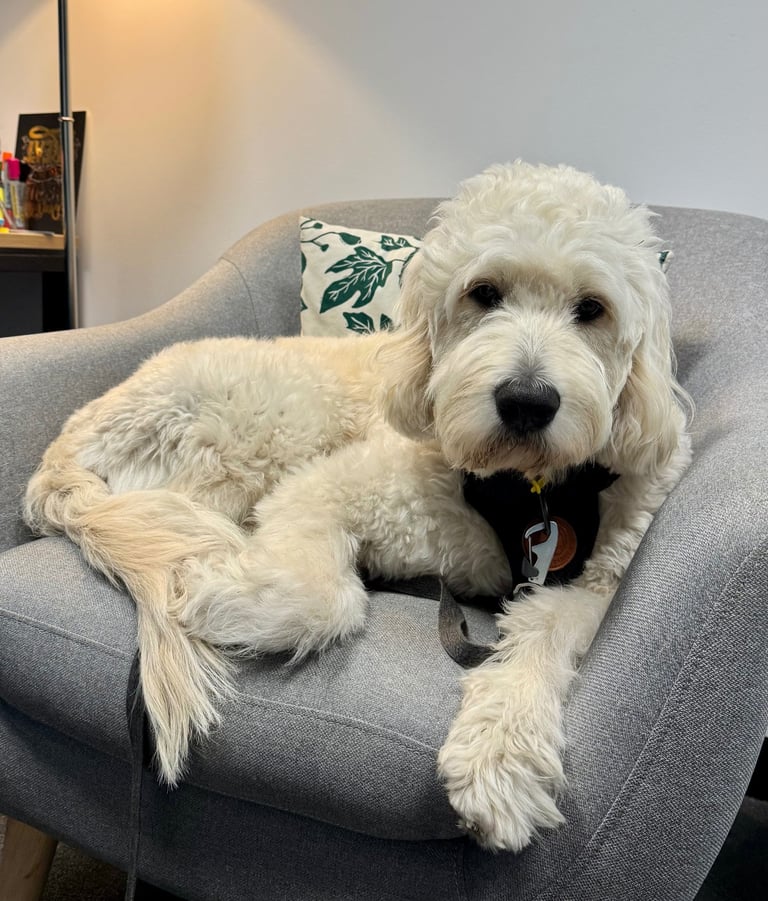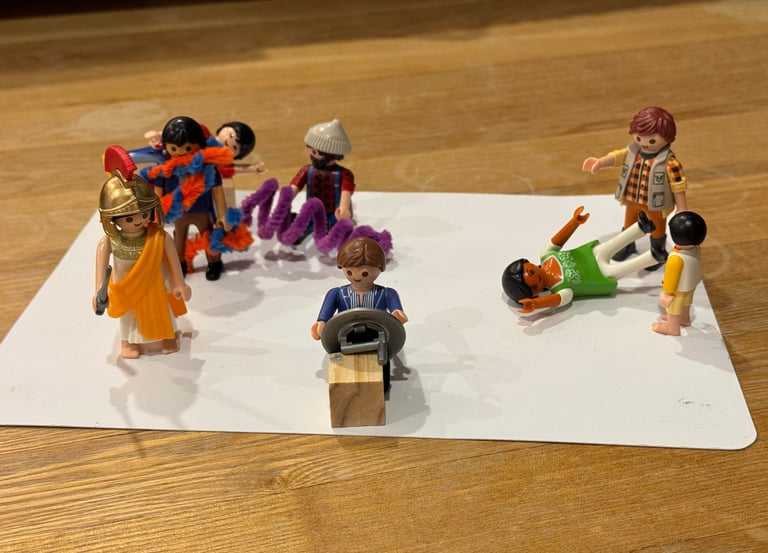Meaningful change through creative play, connection, and contextual insight
Psychologist based in Kew, Melbourne, VIC, Australia. Specialises in creative and play-based applications of evidence‑based interventions; and works with individuals across the lifespan: from primary school age to adulthood.
Explore creative play therapy for profound personal growth and meaningful connections to your internal and external world.
Poly Cheng-Han YANG
Registered Psychologist, MPsych (Professional), GradDipPsych, BEd (Psychology & Counselling)


I’m Poly Cheng-Han Yang, a Melbourne-based psychologist who turns empirical behavioural science into creative, hands-on therapy. From private clinics to community mental health and school wellbeing teams, I help children, adolescents and adults overcome challenges, and take meaningful steps towards the life they want to create.
I have extensive experience in working with a variety of presenting issues, including but not limited to anxiety, depression, trauma, anger management, eating disorders, obsessive-compulsive disorder, addiction, child behaviour issues, social skills, and general life stress. I also have a strong interest in working with people with a chronic health condition. I find it meaningful to increase people’s quality of life by empowering them with cognitive and behaviour strategies to support the management of their health condition and help them build their capacity to engage in life activities of their choice. Moreover, I am a multilingual speaker, and provide consultations in English, Mandarin, and Taiwanese Hokkien.
In terms of therapeutic approach, I believe that people are the experts of themselves, and therefore it's essential to understand the presenting issues from their perspective and then tailor the interventions according to their needs. I believe that psychotherapy is about providing a safe and supportive space for people to explore and understand their inner experiences, then make conscious choices of moving toward the directions according to their values.
I have a special interest in Acceptance and Commitment Therapy (ACT) and Contextual Behaviour Science (CBS), and have completed extensive training in these areas. I also use a range of other evidence-based approaches, including Motivational Interviewing, Compassion Focused Therapy, Cognitive Behavioural Therapy (CBT), and play therapy (Sandplay).
The extensive training and clinical experience have led to my development of Contextual Play Therapy, empowering clients to externalise their inner processes and interpersonal dynamic; process their experience; then enact the first step of change.
Meet Freud,
the Student “Dogtor” in Training
Freud is a learner therapy dog, certified by Lead the Way Institute. He is currently doing his workplace socialisation, so he only sits in with selective clients who are willing and comfortable to help with his training process.
Other than acting cute, all he does in a session is meet, greet, and sleep.


Contextual Play Therapy
Promoting change through expression of inner experience via creative play. based on the latest evidence-based therapy framework. Effective and profoundly impactful with not only children but also people of all ages.


Creative expression of your life and inner experience
Helping people explore emotions and relationships through engaging play-based interventions.
Visualise steps towards meaning change
Facilitating deep understanding of intra- and inter- personal contexts for achievable change.
Contextual Insights
Utilising evidence-based methods to understand challenges in the contexts, and promote meaningful change.
Psychological Constellation Services
Poly works with people across the lifespan: from primary school age to adulthood.
Child Psychotherapy


Play-based therapy for children facing anxiety, depression, trauma, behavioural or learning difficulties. Poly consults with parents and liaises with teachers to tailor strategies for neurodivergent and or learning needs, equipping families and schools with practical tools that support each child’s wellbeing and learning.




Adolescence Psychotherapy
With deep school-system insight, Poly provides creative and evidence -based psychotherapy for teens facing a range of issues; including but not limiting to anxiety, depression, trauma, peer issues, bullying or behavioural challenges.
Poly provides creative, evidence-based psychotherapy for adults pursuing transformative change. Each session weaves expressive techniques with proven behavioural strategies, turning deep insight into practical action plans, supporting people overcome challenges and life transitions while cultivating flexibility, self-compassion and meaning direction.
Adult Psychotherapy
Frequently asked questions
Do I need a referral to see a psychologist?
No referral is required if you’re paying privately. To claim the $98.95 Medicare rebate you’ll need a GP referral and Mental Health Care Plan (MHCP). Private‑health rebates may also apply. Check with your insurer.
To access Medicare or other scheme rebates, please provide your referral documents before your first appointment; namely your GP or specialist’s referral letter and Mental Health Care Plan.
How long is each session?
Standard consultations run for 50 minutes.
What are the fees?
$240 per 50-min-session (lower then the APS recommended fee $311). Medicare rebate $98.95 if eligible.
Which funding schemes do you accept?
Medicare (MHCP)
TAC & WorkCover
NDIS (self‑ or plan‑managed)
DVA
Victims of Crime Assistance (VIC & NSW)
Do you offer therapy in languages other than English?
Yes, sessions are also available in Mandarin and Taiwanese Hokkien.
Contextual Play Therapy FAQs
Do I need artistic skills for this type of therapy ?
Not at all. Contextual Play Therapy is about expression and discovery of your interpersonal and intrapersonal dynamic, not art talent. Curiosity and willingness to express your thoughts and feeling through play is enough.
Is it only for children?
No, adolescents and adults often find it invaluable for various issues via exploring their interpersonal and intrapersonal systems, cultivate willingness to hold the discomfort, and visualising meaningful changes they want to make.
Is this approach evidence‑based?
Yes. Contextual Play Therapy operationalisesRelational Frame Theory (RFT): an empirically tested model of language and cognition, and Process-Based Therapy (PBT): one of the latest major frameworks in evidence-based treatment. Contextual Play Therapy applies RFT and PBT creatively. The process-based therapy movement shifts focus from diagnostic syndromes to
behavioural functions, reflecting a broader move from top-down treatment protocols to bottom-up personalised interventions (Hofmann, Hayes, & Lorscheid, 2021). Contextual Play Therapy contributes to this shift by offering a flexible, creative, and experiential approach, deepening understanding of individual behaviour functions within context.
How is it different from talk‑only therapy?
We use figurines, craft material, sticky notes, symbols, and spatial story‑building to externalise our inner experience, accessing emotions that words alone may miss and rehearsing new responses in scenes.
What if I feel silly using figurines?
Most adults forget the “toys” feeling within minutes and focus on the story building and the link to their experience. Think of it as building a 3D worksheet or mind-map. However, besides words, we also have creative tools to help abstract and express the non-verbal part of our experience.
What issues can it help with?
Contextual Play Therapy is based on transdiagnostic intervention models of RFT and PBT. Therefore, Contextual Play Therapy works with most presenting issues. Putting it more simply, one way of describing therapy is: to promote better relationships with ourselves and with the people around us. Hence, Contextual Play Therapy really offers a unique and creative way of exploring interpersonal relationships and intrapersonal context.
How quickly will I see results?
Although in every therapy, pace is determined by individual needs and circumstances, many clients have gained some insight in the first session of Contextual Play Therapy. The visual, embodied format often accelerates clarity; they often can visualise the next few steps they want to take in their lives in the first scenes of play.
Contact
Poly primarily operates at The Clinical and Health Psychology Group in Kew, Melbourne Victoria, Australia
Location
113-115 Denmark Street, Kew VIC 3101, Australia
Phone
03 9078 8640
Website
Email For Booking
Email For Inquiries
Poly Cheng-Han Yang Psychologist, MPsych
Meaningful change through creative play, connection, and contextual insight.
© 2025. All rights reserved.